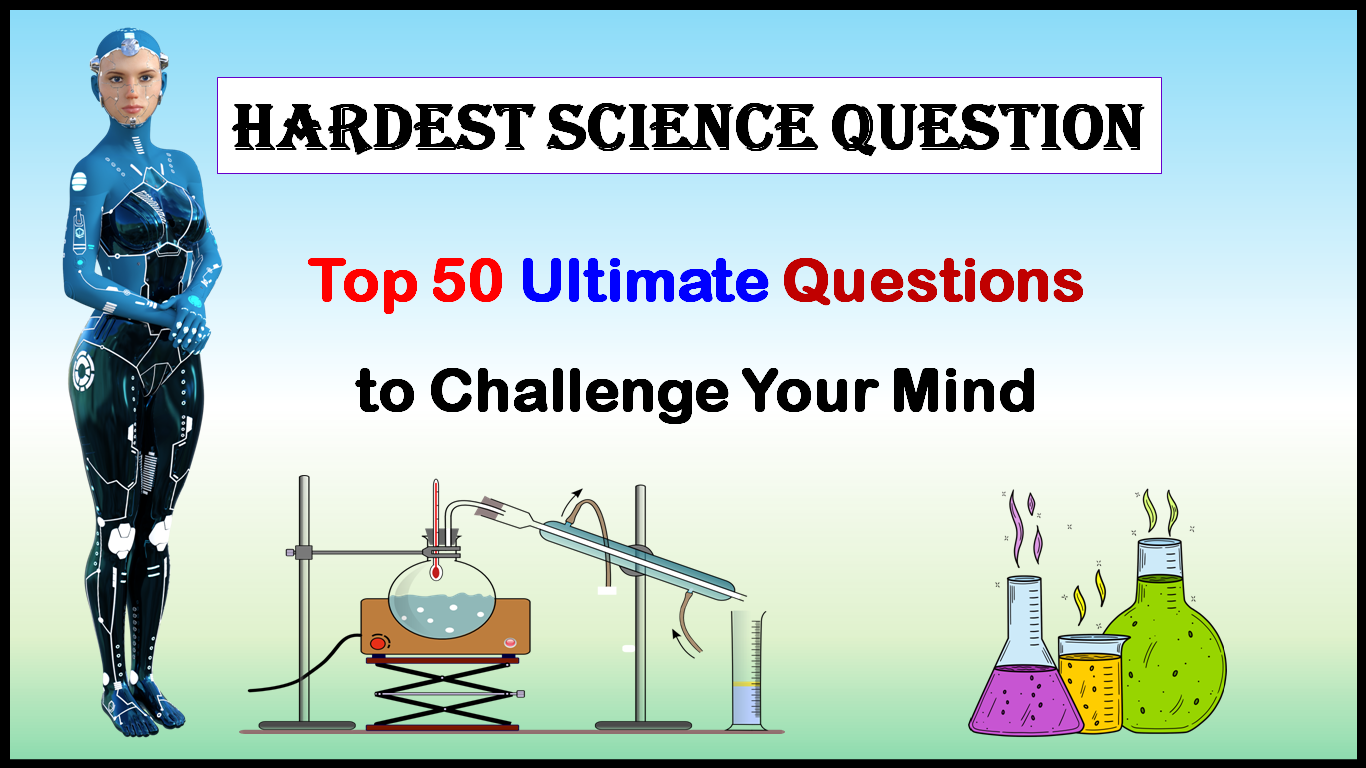
Hardest Science Question: Top 50 Ultimate Questions to Challenge Your Mind
Challenge yourself with the Hardest Science Question! Explore our top 50 coolest science questions and answers covering physics, biology, chemistry and more. Perfect for quiz enthusiasts and curious minds!
Science has always fascinated us with its mysteries and discoveries, pushing the boundaries of what we know about the universe, nature, and ourselves. If you are someone who loves tackling complex questions and diving into the depths of scientific knowledge, you have come to the right place. This post brings together 50 of the hardest science questions designed to stretch your mind and challenge even the most dedicated science enthusiasts. Whether you are preparing for a quiz, refreshing your science knowledge, or simply looking for an intellectual thrill, these questions will test your understanding in physics, biology, chemistry, and earth science. Ready to see if you can answer them all? Dive in and challenge yourself!
Hardest Science Question : Physics Quiz Trivia
1. What is the smallest particle of an element?
(A) Molecule
(B) Atom
(C) Proton
(D) Electron
Answer: (B) Atom
2. What is the primary cause of gravity?
(A) Earth’s rotation
(B) Magnetic fields
(C) Mass
(D) Solar energy
Answer: (C) Mass
3. Which theory explains the relationship between energy and mass?
(A) Theory of Evolution
(B) Special Theory of Relativity
(C) Quantum Mechanics
(D) Newtonian Physics
Answer: (B) Special Theory of Relativity
4. Which particle is known to have no electrical charge?
(A) Electron
(B) Proton
(C) Neutron
(D) Photon
Answer: (C) Neutron
5. What is the unit of electrical resistance?
(A) Volt
(B) Ampere
(C) Ohm
(D) Joule
Answer: (C) Ohm
Hardest Science Question : Chemistry Quiz Trivia
6. What element has the atomic number 1?
(A) Oxygen
(B) Helium
(C) Hydrogen
(D) Nitrogen
Answer: (C) Hydrogen
7. Which is the most reactive non-metal?
(A) Chlorine
(B) Fluorine
(C) Bromine
(D) Iodine
Answer: (B) Fluorine
8. Which gas is known as laughing gas?
(A) Nitrous oxide
(B) Carbon dioxide
(C) Nitric oxide
(D) Ammonia
Answer: (A) Nitrous oxide
9. What is the pH of pure water at 25°C?
(A) 6
(B) 7
(C) 8
(D) 5
Answer: (B) 7
10. Which substance has the highest melting point?
(A) Ice
(B) Iron
(C) Tungsten
(D) Gold
Answer: (C) Tungsten
Hardest Science Question : Biology Quiz Trivia
11. Which blood group is known as the universal donor?
(A) A
(B) B
(C) AB
(D) O
Answer: (D) O
12. What is the powerhouse of the cell?
(A) Nucleus
(B) Ribosome
(C) Mitochondria
(D) Cell membrane
Answer: (C) Mitochondria
13. Which vitamin is essential for blood clotting?
(A) Vitamin A
(B) Vitamin B
(C) Vitamin K
(D) Vitamin D
Answer: (C) Vitamin K
14. What is the main function of the enzyme amylase?
(A) Break down fats
(B) Break down proteins
(C) Break down carbohydrates
(D) Break down DNA
Answer: (C) Break down carbohydrates
15. Which hormone is primarily responsible for human growth?
(A) Insulin
(B) Adrenaline
(C) Estrogen
(D) Growth hormone
Answer: (D) Growth hormone
Hardest Science Question : Astronomy Quiz Trivia
16. Which planet has the shortest day?
(A) Earth
(B) Venus
(C) Jupiter
(D) Mars
Answer: (C) Jupiter
17. What is the closest star to Earth?
(A) Sirius
(B) Alpha Centauri
(C) Betelgeuse
(D) Proxima Centauri
Answer: (D) Proxima Centauri
18. Which galaxy is Earth located in?
(A) Milky Way
(B) Andromeda
(C) Whirlpool
(D) Triangulum
Answer: (A) Milky Way
19. Which planet is known as the “Red Planet”?
(A) Mercury
(B) Mars
(C) Venus
(D) Jupiter
Answer: (B) Mars
20. What is the main element in the Sun?
(A) Oxygen
(B) Helium
(C) Carbon
(D) Hydrogen
Answer: (D) Hydrogen
Hardest Science Question : Earth Science Quiz Trivia
21. What is the Earth’s core primarily made of?
(A) Rock
(B) Iron and nickel
(C) Water
(D) Sand
Answer: (B) Iron and nickel
22. Which is the longest river on Earth?
(A) Amazon
(B) Nile
(C) Mississippi
(D) Yangtze
Answer: (A) Amazon
23. What type of rock is marble?
(A) Igneous
(B) Metamorphic
(C) Sedimentary
(D) Extrusive
Answer: (B) Metamorphic
24. What layer of Earth do we live on?
(A) Crust
(B) Mantle
(C) Outer core
(D) Inner core
Answer: (A) Crust
25. Which gas makes up most of Earth’s atmosphere?
(A) Oxygen
(B) Carbon dioxide
(C) Nitrogen
(D) Hydrogen
Answer: (C) Nitrogen
Hardest Science Question : Human Biology Quiz Trivia
26. Which organ is responsible for filtering blood?
(A) Liver
(B) Kidneys
(C) Lungs
(D) Heart
Answer: (B) Kidneys
27. Which type of blood vessel serves to carry blood away from the heart?
(A) Veins
(B) Capillaries
(C) Arteries
(D) Lymph vessels
Answer: (C) Arteries
28. What is the normal pH of human blood?
(A) 6.5
(B) 7.4
(C) 8.2
(D) 5.8
Answer: (B) 7.4
29. What part of the brain controls balance?
(A) Cerebrum
(B) Cerebellum
(C) Medulla
(D) Pons
Answer: (B) Cerebellum
30. Which organ produces bile?
(A) Stomach
(B) Pancreas
(C) Liver
(D) Gallbladder
Answer: (C) Liver
Hardest Science Question : Technology and Computing Quiz Trivia
31. What does RAM stand for?
(A) Random Access Memory
(B) Read Access Memory
(C) Run Access Memory
(D) Real Access Memory
Answer: (A) Random Access Memory
32. Who is known as the father of the computer?
(A) Albert Einstein
(B) Charles Babbage
(C) Alan Turing
(D) Steve Jobs
Answer: (B) Charles Babbage
33. What does CPU stand for?
(A) Central Processing Unit
(B) Core Processing Unit
(C) Control Processing Unit
(D) Central Power Unit
Answer: (A) Central Processing Unit
34. Which programming language is used for AI development?
(A) Python
(B) HTML
(C) SQL
(D) CSS
Answer: (A) Python
35. What technology is used in fingerprint scanning?
(A) Optical
(B) Ultrasound
(C) RFID
(D) GPS
Answer: (A) Optical
Hardest Science Question : Environmental Science Quiz Trivia
36. What is the main cause of global warming?
(A) Deforestation
(B) Greenhouse gases
(C) Solar flares
(D) Ice age cycles
Answer: (B) Greenhouse gases
37. Which gas is most responsible for acid rain?
(A) Carbon dioxide
(B) Methane
(C) Sulfur dioxide
(D) Nitrogen
Answer: (C) Sulfur dioxide
38. What is the main source of energy received by the Earth?
(A) Moon
(B) Sun
(C) Oceans
(D) Earth’s core
Answer: (B) Sun
39. What process converts carbon dioxide to oxygen?
(A) Respiration
(B) Photosynthesis
(C) Oxidation
(D) Decomposition
Answer: (B) Photosynthesis
40. Which ecosystem is most diverse?
(A) Desert
(B) Forest
(C) Ocean
(D) Rainforest
Answer: (D) Rainforest
Hardest Science Question : Advanced Science Quiz Trivia
41. Which of the following is the chemical formula of table salt?
(A) NaCl
(B) KCl
(C) NaNO₃
(D) Na₂SO₄
Answer: (A) NaCl
42. Which of these planets has the largest number of moons?
(A) Earth
(B) Saturn
(C) Venus
(D) Mars
Answer: (B) Saturn
43. What type of organism is responsible for malaria?
(A) Virus
(B) Bacteria
(C) Fungus
(D) Protozoan
Answer: (D) Protozoan
44. Which vitamin deficiency causes scurvy?
(A) Vitamin A
(B) Vitamin C
(C) Vitamin D
(D) Vitamin E
Answer: (B) Vitamin C
45. What is the term for animals that are active during the night?
(A) Diurnal
(B) Nocturnal
(C) Crepuscular
(D) Arboreal
Answer: (B) Nocturnal
46. What force causes tides on Earth?
(A) Wind
(B) Earth’s rotation
(C) Gravity from the Moon
(D) Ocean currents
Answer: (C) Gravity from the Moon
47. Which planet has the highest surface temperature in our solar system?
(A) Earth
(B) Mars
(C) Jupiter
(D) Venus
Answer: (D) Venus
48. What is the most abundant element in the universe?
(A) Oxygen
(B) Hydrogen
(C) Nitrogen
(D) Carbon
Answer: (B) Hydrogen
49. Which part of the cell is primarily responsible for packaging proteins?
(A) Ribosome
(B) Nucleus
(C) Golgi apparatus
(D) Mitochondria
Answer: (C) Golgi apparatus
50. In the periodic table, what group do the noble gases belong to?
(A) Group 1
(B) Group 14
(C) Group 18
(D) Group 2
Answer: (C) Group 18





Leave a Reply